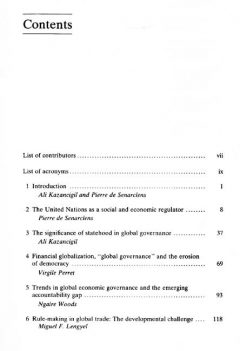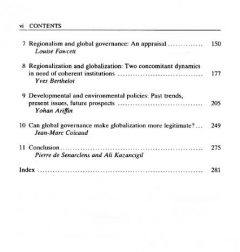While globalization is thriving, its consequences remain contradictory and controversial. Despite being an effective process in generating economic growth, globalization also leads to excessive concentrations of wealth and increased inequalities within and between countries. The resulting imbalances can be explained to a large extent by regulatory deficiencies in the economic, financial, commercial and environmental sectors stemming from unaccountable, undemocratic, inequitable and ineffective global governance. The authors offer critical historic and forward-looking analyses on current global governance and formulate proposals towards more accountable, transparent and participatory global governance as well as its institutional architecture for a regulation of globalization that combines economic efficiency and social equity. Emphasis is put on multi-level governance, underlining the relevance of regional governance as a link between the local and global. A central argument in the volume is that the legitimacy of global governance is weak, while the way to make it more legitimate is to enhance the participation of state and non-state agents, give a strong role to statehood and democratic politics, and place priority on the public interest over private/corporate interests.
Regulating Globalization: Critical Approaches to Global Governance
In stock
Free & Quick Delivery Worldwide
reviews
Bibliographic information
Title
Regulating Globalization: Critical Approaches to Global Governance
Author
Edition
1st ed.
Publisher
Rawat Publications, 2008
ISBN
9788131601792
Length
xii+296p., Index; 26cm.
Subjects








There are no reviews yet.